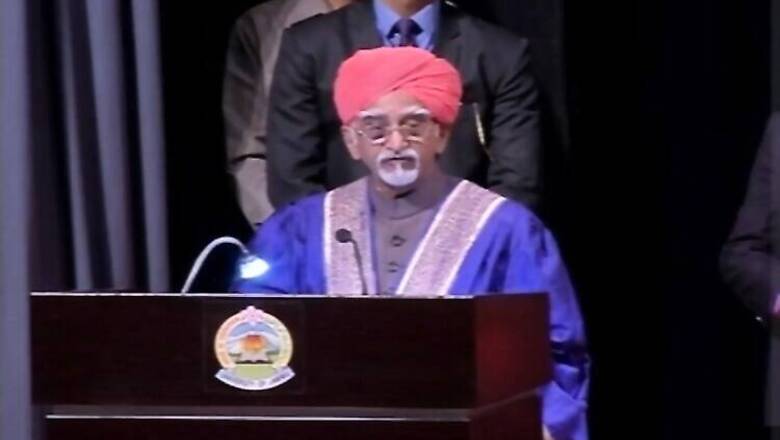
views
Jammu: Principles of faith need to be segregated from contours of culture, Vice President Mohammad Hamid Ansari said on Saturday even as he questioned if a more complete separation of religion and politics might not better serve Indian democracy.
Quoting set of judgements in Bommai case, the Vice President said, "The principle so laid down is emphatic. Despite its clarity, however, different interpretations were placed on it and there is no real consensus within the court on what secularism entails. It has been opined that what the court said is different from what it did.
"Observers have noted that subsequent pronouncements of the Supreme Court have effectively vindicated the profoundly anti-secular vision of secularism of some quarters. For this reason, it has been argued whether a more complete separation of religion and politics might not better serve Indian democracy," Ansari said while addressing 16th convocation of the University of Jammu.
"The difficulty lies in delineating, for purposes of public policy and practice, the line that separates them from religion...Since a wall of separation is not possible under Indian conditions, the challenge is to develop a formula for equidistance and minimum involvement.
"For this purpose, principles of faith need to be segregated from contours of culture since a conflation of the two obfuscates the boundaries of both and creates space to equivocalness. Furthermore, such an argument could be availed of by other faiths in the land since all claim a cultural sphere and a historical justification for it," he said.
He said a few years ago in a volume published on the occasion of Golden Jubilee of the Supreme Court, two eminent jurists had observed that "as we transit into the next millennium, the Supreme Court has a lot to reflect upon and not least on how to protect the minorities and their ilk from the onslaught of majoritarianism".
He said unless the court strives in every possible way to assure that the Constitution, the law, applies fairly to all citizens, the court cannot be said to have fulfilled its custodial responsibility.
"Is it therefore bold to expect that the Supreme Court may consider, in its wisdom, to clarify the contours within which the principles of secularism and composite culture should operate with a view to strengthen their functional modality and remove ambiguities that have crept in?" Ansari said.
The Vice President said our founding fathers gave a Constitution that encapsulates the ideals and values of people of India.
"The first among these is justice and as John Rawls put it rights secured by justice are not subject to political bargaining or to the calculus of social interest. To ensure this Article 32 of the Constitution gives us the right to move the Supreme Court which has the power to take corrective measures for the enforcement of these rights," he said.
He said a similar power is conferred, within their area of competence, on the High Courts under Article 226.
"From this emanates the centrality of the judiciary in securing for citizens the rights bestowed by the constitution. In our own times as an eminent judge elsewhere noted some years back, people increasingly turn to the judiciary hoping it can solve pressing social problems," he said.
He said one of the matters in the societal domain that figures prominently in public discourse relates to the constitutional ideal of India being a "secular" republic having a "composite culture".
"Any discussion of these constitutional values has to be premised on the existential reality of our society. It is characterised by heterogeneity, a population of 1.3 billion comprising of over 4,635 communities, 78 per cent of whom are not only linguistic and cultural but social categories", he said.
He said religious minorities constitutes 19.4 per cent of the total.
"Our democratic polity and its secular state structure were put in place in full awareness of this plurality. There was no suggestion to erase identities and homogenise them," he said.
He said whether India develop as a melting pot of culture or only remained a salad bowl is no more the issue.
"The crucial question is whether Indian culture is conceived as a static phenomenon, tracing its identity to a single unchanging source, or a dynamic phenomenon, critically and creatively interrogating all that is new," he said.













Comments
0 comment